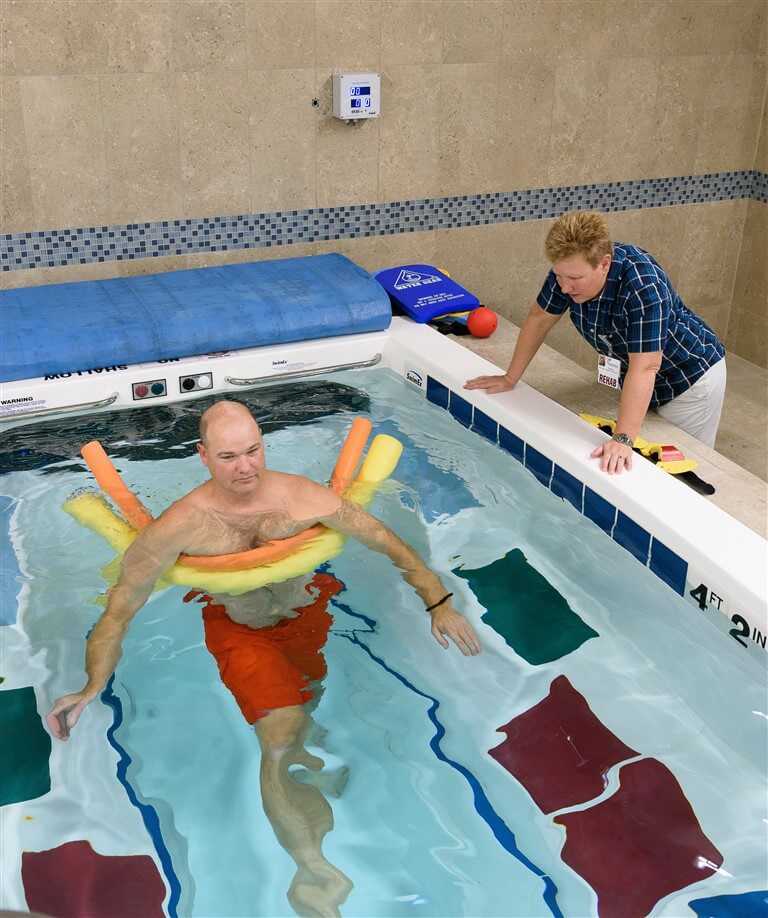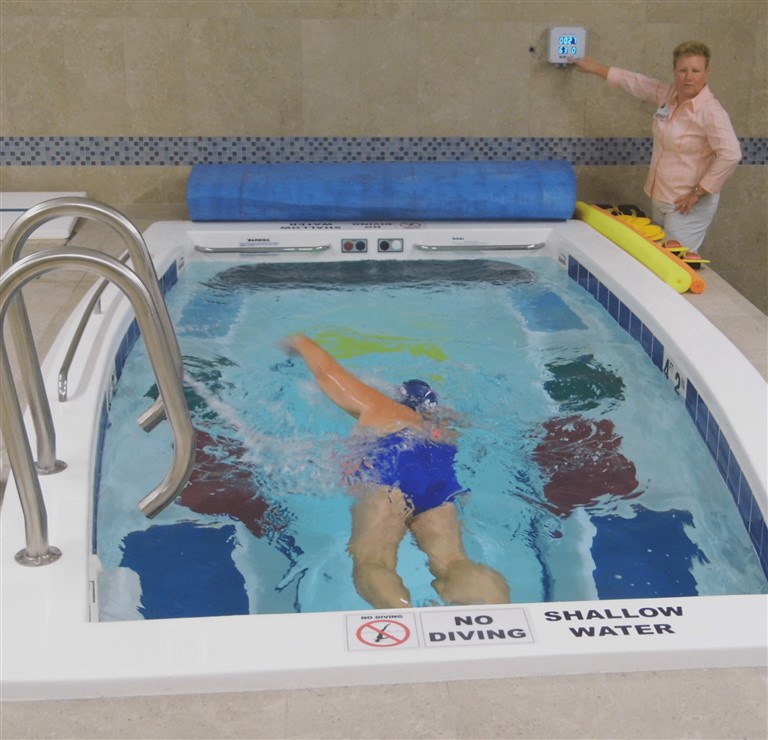At Frederick Memorial Hospital in Maryland, the philosophy is simple. Teams at this physical therapy clinic individually tailor each patient’s rehabilitation program. The goal: to help patients return to the lifestyle and activities they desire, improving their quality of life. Aquatic therapy is one of their central tools, using a SwimEx hydrotherapy pool. Here’s what they treat and how it works.
Fibromyalgia and chronic pain
The clinic sees many patients who suffer from these conditions. They often arrive after they have tried everything else and nothing has helped their pain and inability to sleep. Aquatic therapy offers consistent pain relief and a way for them to become more active, gain strength and endurance, and sleep better.

Thoracic and lumbar spine issues, cervical spine and posture problems
The hospital physical therapy clinic successfully uses hydrotherapy for lumbar spine fusions, spine compression fractures, herniated discs, and mostly degenerative types like spinal stenosis.
From back surgeries to degenerative or arthritic issues, the water decreases the effects of gravity on the spine. In addition, it creates traction for the spine when the patient is floating vertically and holding a flotation device without touching the bottom of the pool. Water makes it easier for a patient to work on core stabilization throughout the spine. It allows increased trunk/back movement with less pain due to the warmth, buoyancy, and pressure of the water.
Lymphedema
Water’s hydrostatic pressure helps decrease swelling in the extremities, most commonly the LEs, and allows the patient to do general strengthening in all of their extremities with less effort and pain. It also improves ease of walking.
Achilles tendon repairs, tears, and toe, foot or ankle fractures
The clinic effectively treats foot and ankle issues/post-surgery protocols that require limited weight bearing per the patient’s doctor.
Due to the anti-gravity properties of the water, patients can adhere to weight bearing restrictions mandated by their doctor. They can walk in the water without an assistive device or a boot. The water helps decreases swelling and results in a less painful session. The patients can work on balance long before they are cleared by their doctor to WBAT on land.

Knee or hip replacements
The clinic commonly treat ACL repairs, arthroscopic repairs of hip/knee, and patellar tendon repairs.
The water is good for ROM, stretching, and strengthening of any knee or hip diagnoses. Compared to land sessions, it effectively helps to decrease soreness during and after PT sessions. The clinic’s physical therapists can schedule exercises and activities in the water that are still too painful or challenging to do on land.
Morbidly obese patients with low tolerance for land-based therapy
Sometimes what holds patients back from therapy sessions is their inability to complete the exercises. This is where the buoyancy of water greatly helps by making it easier exercise. Patients gain the confidence to continue in the water that they might not otherwise get on land. Physical therapy clinics looking to offer aquatics to this population should consider pool access before buying a hydrotherapy pool. Understand chair lift weight restrictions, and look at whether the pool has steps or ladders or a ramp to enter/exit the pool safely.
General deconditioning
Patients that cannot tolerate land exercises and activities well enough to make progress in their movement and strength training benefit greatly from aquatic physical therapy. The clinic’s programs help with weight loss, improve overall movement, decrease pain, increase overall endurance, and increase overall function at a slower and less painful pace.
Water therapy offers a successful, pain-free experience that patients can take with them to manage almost any ailment they encounter during their lifetime. Water has truly amazing healing properties! The clinic’s physical therapists have seen it work miracles time and time again with their patients.
Information for this article was provided by Frederick Memorial Hospital physical therapists. We hope we were able to give you good insights into diagnoses that are easily treated in the pool. If you believe you need therapy, whether in a pool or on land, first consult your doctor or medical professional.
